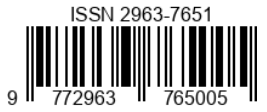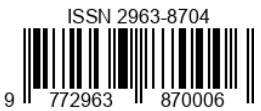Kejahatan Dunia Maya Terkait Hoaks Saat Pandemi Covid 19
DOI:
https://doi.org/10.55606/jhpis.v1i1.1723Keywords:
cyber crime, Hoax, covid 19Abstract
Crimes that often occur in cyberspace are crimes that are relatively new, cybercrime is growing rapidly along with the development of internet technology that is happening today. The spread of hoaxes during the Covid 19 pandemic has become a big problem because many people believe hoaxes, causing the handling of Covid 19 to be very slow and causing many victims. The Covid 19 pandemic has forced all people in the world, including Indonesia, to be comfortable living side by side with Covid 19. This research uses a normative legal research method using a statutory approach. The main source of this research is regulations. The results of this study indicate several crimes that can be used as protection by consumers who experience losses due to fake news amid the Covid 19 pandemic, namely Article 14 paragraph (1), paragraph (2), Article 15 Article 14 paragraph (1) and Article 45A paragraph (1). ) and (2), and article 28 of Law Number 11 of 2008 concerning Information and Electronic Transactions.
Downloads
References
Chumairoh, Hanik. 2020. Ancaman Berita Bohong di Tengah Pandemi Covid 19. VOX POPULI Volume 3. Nomor 1.
Hartono, C. F. G. S. 1994. Penelitian hukum di Indonesia pada akhir abad ke-20. Alumni, Bandung.
Haryanto, A. T. 2021. Pengguna Internet Indonesia Tembus 202,6 Juta. Jakarta: detikinet. Diakses tanggal 01 Oktober 2021. Pukul 08.10.
Henry Stuart et al. 2000. Constitutive criminology: origins, core concepts, and evaluation.
Hunt Allcott and Matthew Gentzkow. 2017. Social Media andFake News in the 2016 Election, Journal of Economic Perspectives, Spring 31 (2).
Institut for Criminal Justice Reform (ICJR). 2020. Tanggapan Terhadap Pemberitaan Berita Bohong. Jakarta.
Matthew et al. 1975. 1945-Form of Hoaks in The Tales of Edgar Allan Poe.
Moeljatno. 2002. Asas-asas hukum pidana. Rineka Cipta. Jakarta.
Muhammad Tafriet et al. 2019. User Motivation Analysis in Sharing Hoakses in Indonesia. Jakarta.
Pranesti, Dewi Ayu, Arifin, Ridwan. 2019. Perlindungan Korban Dalam Kasus Penyebaran Berita Hoaks Di Media Sosial Di Indonesia, JURNAL HUKUM MEDIA BHAKTI, Vol.3, No.1, Juni 2019.
Sunggono, B. 2016. Metodologi penelitian hukum (Cetakan Ke-15). PT RajaGrafindo Persada, Jakarta.
Tresya, T. 2020. Sifat Melawan Hukum Materiil Dalam Perbuatan Pidana Penanganan Bencana Non-Alam Covid 19. JURNAL BELO, 6(1).
Trisna, Firman Rostama. 2019. Tindakan Hukum Terhadap Penyebaran Berita Bohong (Hoak) Di Media Sosial Berdasarkan UU Nomor 19 Tahun 2016 Tentang Informasi Dan Transaksi Elektronik, MAKSIGAMA, Volume 13 Nomor 1, 2019.
Wahid, A., & Labib, M. 2005. Kejahatan Mayantara (Cyber Crime). Refika Aditama, Bandung.
Yazid, F. 2020. Penerapan Sanksi Pidana Terhadap Pengambilan Paksa Jenasah Pasien Covid 19 Di Indonesia. Jurnal Belo, Vol.6(1).
Masyarakat Telekomunikasi, “Hasil Survei Wabah Hoaks Nasional 2019”, 10 April 2019 https://mastel.id/hasil-survey-wabah-hoaks-nasional-2019/. Diakses 27 September 2021 Pukul 08.30 wib
http://www.mediaindonesia.com/index.php/news/read/91080/melawan-Hoaks-membangun-gerakan-literasi- 1/2017-02-08. Diakses pada 30/09/2021. Pukul 20.45.

















